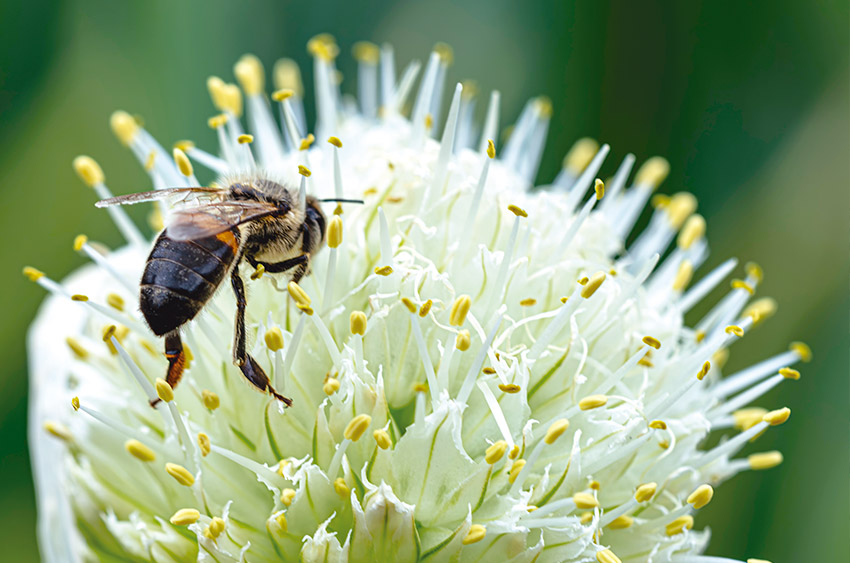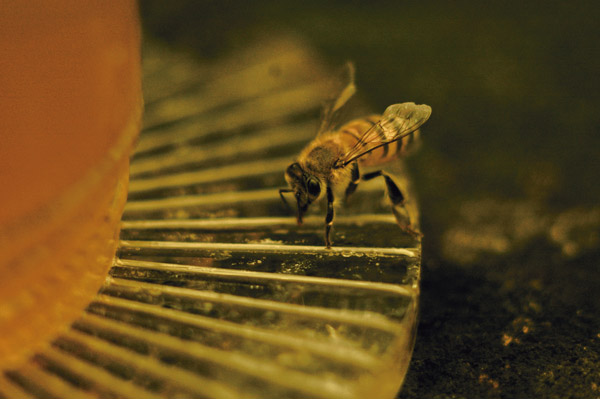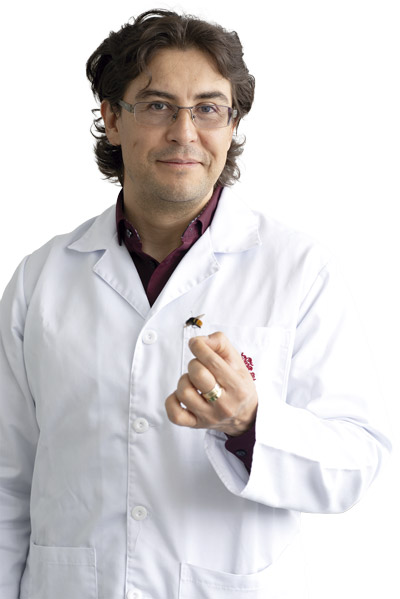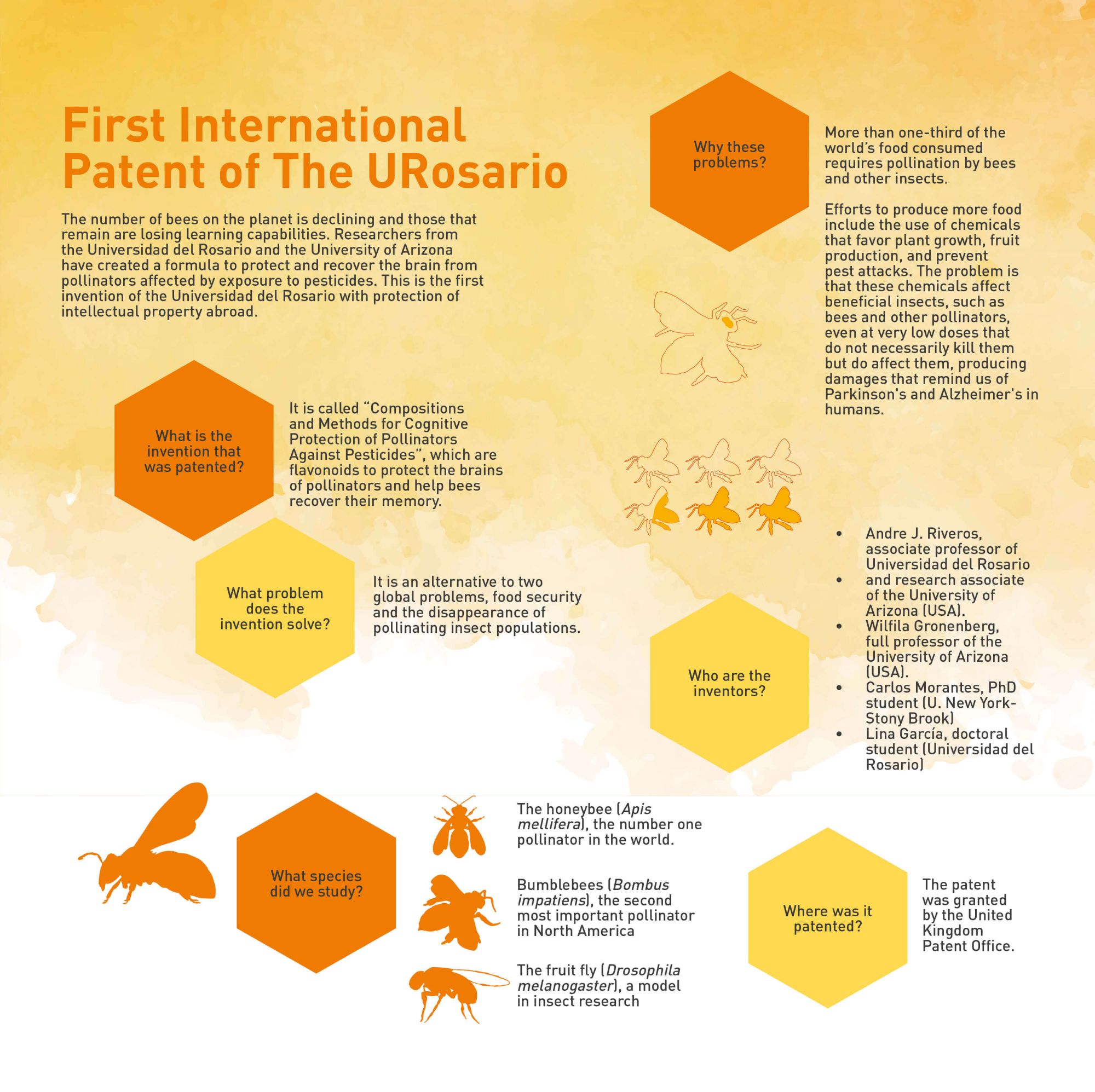Innovation to Protect the Brains of Pollinators: Flavonoids May Help Bees Recover Their Memory
By: Ximena Serrano Gil
Photos: Andre Riveros, Milagro Castro DOI https://doi.org/10.12804/ dvcn_10336.42342_num7
Environment

By: Ximena Serrano Gil
Photos: Andre Riveros, Milagro Castro DOI https://doi.org/10.12804/ dvcn_10336.42342_num7
In a world where giants often grab attention, there are tiny heroes who perform feats that go far beyond their size. We are talking about bees, those little buzzers that with their brains the size of a pin's head play a vital role in maintaining the balance of natural ecosystems and in food production for humanity.
However, these winged heroines face a silent and lethal enemy: pesticides. Exposure to these chemicals causes them to have sub-lethal effects, i.e. those that do not cause death, but affect their abilities and thus endanger their conservation. According to figures from the Bee Informed Partnership,an NGO that groups researchers and university laboratories in the United States, between April 2022 and April 2023, beekeepers in the United States lost about 48.2 percent of their honey bee (honey bee) colonies.
Fortunately, science and nature come together to protect these tireless workers. Researchers from theFaculty of Natural Sciences at Universidad del Rosario in alliance with the Department of Neuroscience at the University of Arizona developed a formula that reduces these alterations. The results were published in the Journal of Experimental Biology.

Bees that consumed flavonoids experienced improvements in their ability to learn, make decisions and motor behavior, suggesting that these compounds may be key to preserving the cognitive health of these insects.
Andre Josafat Riveros, biologist and doctor of Behavior and Neuroscience, as well as associate professor in the Department of Biology at URosario and who leads the research, explains that the alterations observed in bees –caused by several factors, among which are chemical synthesis pesticides– consist of memory loss and, therefore, learning difficulty, decreased capacity for decision-making, inhibition of motor skills and reduced capacity to cope with diseases. In other words: “You have a bee that doesn't know where the flowers are or that if it reaches them, it may not remember where the hive is. It may also not have enough strength to move between them efficiently and if it encounters viruses or other pathogens in the environment, it cannot be defended effectively,” he argues.
“Our results suggest that a food supplement designed from plant derivatives has a protective effect on some parts of the brain, which supports the use of these to counteract the harmful effects of pesticides,” Riveros says.
The Remedy is in the Plants
The growing need to supply a growing global population, according to the OECDreport, has led to an increase in pesticide use in agriculture. However, this practice has a devastating impact on bee populations, a critical player in pollinating essential crops, as reported by the Bee Informed Partnership.
For his part, entomologist Edison Torrado-León, founder and general director of the ENTOMAInstitute and a professor of Universidad Nacional de Colombia, he says that although pesticides play an important role in protecting crops against pests –which helps increase agricultural production and ensure food security– bee conservation is also crucial, as they are key pollinators to ensure sustainable food production.
Therefore, “it is important to find a balance between the responsible use of pesticides and the protection of bees,” he emphasizes.
The central problem is that the pesticides used do not distinguish between beneficial and harmful insects, and bees are particularly affected by this situation. According to Andre Riveros, “we have found that bees are not making good decisions, they are no longer learning.”
Two of the causes of these conditions are fipronil and imidacloprid, the most common neurotoxicants in agriculture. The former induces neuronal hyperexcitability and causes motor alterations, as well as loss of memory retention in bees. Meanwhile, the second is a neonicotinoid that damages the learning process, memory, motor control, and sensory capacity of these important pollinators, even if exposed to very low concentrations.
In order to counteract these deteriorations, the researchers looked for a solution to shield the bees and focused their attention on flavonoids, a series of secondary metabolites derived from plants that possess defensive, antioxidant and anti-inflammatory properties, among others. Riveros explains: “We have analyzed that if these metabolites are recognized as having physiological protective effects in humans, they could also be transferred to protection possibilities in bees.”
According to the results of the research, bees fed a diet rich in flavonoids showed remarkable protection against the harmful impact of pesticides. According to Riveros, “his memories were significantly better.” In addition, bees that consumed flavonoids experienced improvements in their ability to learn, make decisions and motor behavior, suggesting that these compounds may be key to preserving the cognitive health of these insects.
A Good Diet is Necessary
This research focused on two species of pollinators: the Apis mellifera (commonly known as the honey bee, the same as the famous animated character called the “Mayan bee”) and the bumblebees of the genus Bombus. Although these two insects are the protagonists, the development product of the research becomes a cornerstone for the conservation of the nearly 20 000 species of bees that exist in the world.
This dietary supplement, which has protection records Intellectual property, it has been specifically designed to safeguard pollinators. It is a precise mixture of molecules encapsulated in microdroplets. Once the bees consume it they begin to develop protection within a few days, which has a significant impact on their survival.
The immediate question is: What would happen if other pest insects, such as moth larvae, tysanoptera (thrips), or red spiders, also consume this supplement? The neurobiologist Riveros points out that nutritional supplementation is carried out within the nests of these species, where pests are not present or have access. They use what beekeepers call “cakes,” a mixture of pollen, honey, or syrups combined with the supplement. “This strategy ensures that only the pollinators we consider benefit from this protection, while pests are excluded,” says the researcher.
An essential complement to this work is the strategy of urban gardens. Riveros and his team propose to identify the plants that in their pollen or nectar offer high quality food for bees. This translates into the planting of specific plant species in urban areas, with the purpose of developing strategically thought gardens to provide pollinating insects with the food they need to thrive. “It is not just about eating, but about eating well,” he concludes.
Other scopes
Beyond the results on these bee populations, the studies carried out by Universidad del Rosario group led by Riveros have other scopes. For example, by exposing the fruit fly (Drosophila melanogaster) to some of these insecticides, the specimens showed symptoms similar to those seen in a patient with Parkinson's disease: involuntary movements and stiffness, mainly; a finding called “Parkinsonian phenotype.". This particularity was studied by the group, together with researchers of Universidad Nacional, in both bees and fruit flies, and the results were also published in the Journal Experimental Biology. They showed that the use of flavonoids protected fruit flies against such a phenotype.
Scientists used the fruit fly because it has a short life cycle (about 2 weeks), its reproductive capacity is fast, and its genome is well characterized. All this makes it an ideal model to study various biological and genetic processes, and therefore it is frequently used to evaluate drugs or chemical compounds.
The authors stress the importance of understanding the impact of pesticides on wildlife, but at the same time suggest possible implications for human health.
A 2022 World Health Organization (WHO) report indicates that the prevalence (a measure of the number of total cases at any given time) of Parkinson’s disease has doubled over the past 25 years. This is why Riveros points out that research on flies could lead to benefits for human health, as he believes that supplying these specific natural molecules to people, bees and flies would somehow contribute to the protection of living organisms and tissues.
This study reveals once again the interconnection between environmental health and human health, while highlighting the need to address the effects of pesticides more broadly and to consider the consequences of these substances on other living things.
The next phase of research is focused on confirming whether the formula designed can also function as an antidote to bees that have already been poisoned with pesticides, in order to recover them.

The central problem is that the pesticides used do not distinguish between beneficial and harmful insects, and bees are particularly affected by this situation. According to Andre Riveros, professor in the Faculty of Natural Sciences at Universidad del Rosario and leader of the research, they have found that bees are not making good decisions, they are no longer learning.
Hunger is an immediate global issue, and collaboration among scientists, farmers, and policymakers is essential to ensuring a sustainable future for the entire planet. Advances such as the one highlighted in this article, developed through the teamwork of researchers of Universidad del Rosario and the National Assembly, represent a fundamental step in the protection of bees and, therefore, in the preservation of biodiversity, global food production and public health. Flavonoids, transformed into dietary supplements, could be a valuable tool to reduce the negative impact of pesticides on bee populations and ultimately on human food security.
Regulations Regarding the Use of Fipronil
In response to the need to produce a greater quantity of food and to prevent crop loss, over 2 million tons of pesticides (herbicides, insecticides, fungicides, and bactericides, among others) were applied globally in 2019, according to a study published in the Journal of Toxicology.
The sublethal impairment associated with insecticide exposure, affecting individual and colony levels, has led to bans in some countries. In Colombia, a technical study conducted by the Corporación Colombiana de Investigación Agropecuaria (Agrosavia) Colombian Corporation for Agricultural Research revealed that the indiscriminate use of fipronil is intrinsically linked to bee deaths. Consequently, the Colombian Agricultural Institute (ICA) issued Resolution 740 of 2023, which seeks to prohibit the use of fipronil in the country and thus mitigate the harmful effects of this molecule. (2023)
The resolution outlines three main points:
- Prohibit the immediate import of fipronil as a raw material, as well as the import of the finished product.
- Cancel registers of chemical pesticides containing fipronil in their composition.
- Give 12 months to look for alternative replacements.
